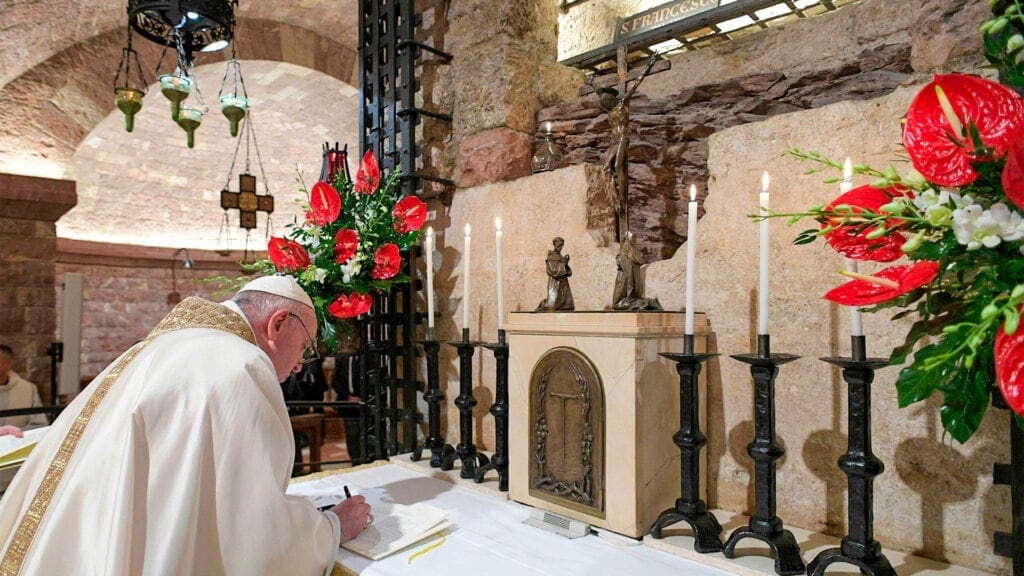
The semesters that I teach Catholic social teaching, my students can be challenged not only by memorizing the Latin titles of papal encyclicals, but also the dates of them as well as the issues addressed in each. I encourage them to approach these richly inspirational texts with an appreciation that Catholic social teaching always tackles contemporary social, political, and economic concerns. If one knows one’s history, one will understand that which the Church is addressing. It is a matter of context and content.
Austen Ivereigh, Pope Francis’ biographer, has suggested rightly that Fratelli Tutti should be read much like Pope Benedict’s own triptych of encyclicals on faith, hope, and love. For Francis, Ivereigh argues, Fratelli Tutti completes his own triptych. Evangelii Gaudium focused on how we are to live in relationship with God. Laudato Si’ investigated our relationship with the global ecosystem. Fratelli Tutti examines our commitment to global solidarity, particularly with the more marginalized and those on the peripheries of society.
While I appreciate Ivereigh’s insight, I believe there also is a more immanent context. It is the health and well-being of the global village since the beginning of 2020 and how the pope has understood God’s promptings during this time.
On the afternoon of March 27, 2020, most of the members of my local community here at St. John’s University gathered in our common room to watch Pope Francis’ Urbi et orbi prayer from a dark and empty St. Peter’s Square at the Vatican. None of us confreres spoke a work during this time; it was a profound gripping service. The pope’s words were our sentiments and his movements including blessing the world with blessed sacrament were our hope. In his homily, Pope Francis used Mark’s passage about calming of the sea (4:35-41) to capture the global village’s position. The world was overwhelmed with a biological crisis. A deadly virus had taken possession of our daily routines, and no end seemingly was in sight. The pandemic made most of us feel very vulnerable and lead others to despair. The holy father was calling on God to walk with the human community during this horribly exhausting and terribly exhausting pandemic. The holy father called upon God to renew humanity’s faith in God’s divine presence amongst us for we, like the apostles, have been crying out “Teacher, do you not care that we are perishing?”
At the end of the pope’s remarks, he encouraged us the faithful: “Do not be afraid” (Mt 28:5) for we, like Peter can “cast all our anxieties onto you (sic), for you care about us” (1 Pet 5:7). While a very comforting message in its entirety, the midsection of the holy father’s message is one not to miss as it forms a prelude to Fratelli Tutti . It addresses the reasons why we might be afraid or be lacking in faith. Pope Francis returns to a foundational theme of his pontificate, as he expressed in previous encyclicals Evangelii Gaudium and Laudato Si: self-referentiality. Without God, it is all about me. When it comes to painful existential realities like Covid-19 where I do not have the power to alter what is before me, hopelessness can crush me. Pope Francis summoned the community then as he does in Fratelli Tutti to a “Lent” of conversion echoing the words of the prophet Joel “return to me with all your heart” (2:12).” The holy father’s words were impactful as evidence ensued about the liveliness and growth of faith among people even given the reality that churches were shuttered and worship moved online. The Pew Foundation recently reported that 24% of those surveyed said their faith had become stronger during this horrid time. Only 2% reported their faith becoming weaker while 47% related that their faith has not changed much. More recently, the Foundation distributed another set of results that indicated that a significant number (86%) of Americans see lessons to be learned from the pandemic. 35% believe that those lessons are promptings from God to make amends and restructure a more hopeful inclusive future. This set of results echoed Pope Francis’ keen observation that the Coronavirus crisis was a decisive moment for the global community to rebuild their relationship with God. The global health crisis is “a time to choose what matters and what passes away, a time to separate what is necessary from what is not.”
This time is or, better yet, can be the moment of restoration of God’s place in our personal lives, relationships, and creation. Even give the crippling stress we experience at these times of confinement, safety, and uncertainty, these days also can serve as a keen opportunity to right our regard for the relationships “that matter.” In light of our global health crisis, Pope Francis’ promulgation Fratelli Tutti makes immense sense. Now, it is a matter to investigate the holy father’s words and respond accordingly.
Department of Theology & Religious Studies
St. John’s College of Liberal Arts & Sciences
Photo Servizio Fotografico-Vatican Media
(cfr. Legge CXXXII in data 1°settembre2017sulla protezione del diritto di autore sulle opere dell’ingegno e dei diritti connessi”, artt. 3§2 e 3§3)

